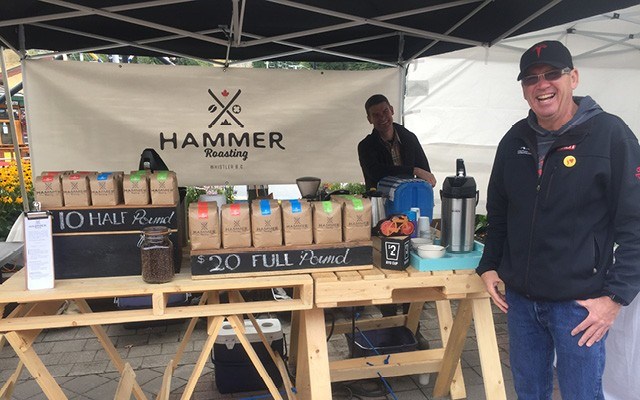It's Sunday morning and after three-plus hours of set-up, the Whistler Farmers' Market is on.
I'm cruising with manager Chris Quinlan, who sports a straw hat. He's been hustling all morning but there are still questions to field and issues to solve: move a tent here so a storefront isn't impacted; shift some things there to clear sightlines. And then, once things are humming, it's time for a roving Facebook Live gig. We begin at the south end by the popcorn/lemonade stand. Quinny introduces his weekly segment and we proceed upstream into the crowd, chatting about the market, local produce and, at AWARE's recycling stall, the bugbear of waste management. Afterward we stroll some more, until Quinlan has to peel off briefly into administrative work. But when that's done, he's right back to walking. The market is 500 metres end-to-end, so he can walk up to 20 kilometres a day.
With many locals getting their shopping done early, the crowd is thick by noon. Now as we walk, we're also forced to manoeuvre. Around people on phones, or looking one way while walking the other. Folks paused to hear music. Kids. Strollers. Leashes wrapping our legs. "Dogs are an issue," notes Quinny. "But you can't ban them so you just hope people keep the leashes tight."
Suddenly, the crowd parts to reveal a guy on a bike with a cooler-trailer handing out free cans of Kicking Horse Coffee. As diplomatically as possible given the egregious offence, Quinny — whose job also entails protecting vendors' interests — gives him the heave-ho, explaining how his guerilla marketing impinges on Hammer Coffee Roaster's paid-for concession. The interloper apologizes; he's just a kid whose boss sent him in. It's not the first such market infiltration Quinlan has had to police. "People have actually set up their own stalls here," he notes. "One time someone tried to sell puppies from a box."
By 1 p.m., the grape lady from the Sunshine Coast is almost sold out and the bike valet is full. Funded from the RMOW's pay parking, the innovative service saw 30-some bikes on its inaugural day, and has since handled up to 150, success enough to inspire a month-long valet trial in the village. It's just another welcome spin-off from the "come-for-an-hour-stay-for-a-day" market that has been driving commerce on the Upper Village Stroll for 24 years now. "Given that history, renaming it 'Market Stroll' might be more appropriate," notes Quinlan.
His own involvement began in 2010. Still on town council and having just shut down Quinny's Café, he bumped into market board member Rick Clare, who mentioned they needed a manager. Quinny took the job on with a mandate to go big. With Whistler Blackcomb supportive of expanding, he took the weekly event from a 55-vendor max to its current 90, with a concomitant increase in crowds — good news for an institution whose stated goal is to enable the local economy. The more people who attend the market, the more other local businesses are supported. It's also a great way for vendors to build brand recognition. Purebread, Nonna Pia's, and Caveman Grocer can all claim Whistler Farmers' Market roots. And the financial benefits are spread around: about $12K of the record $118K collected in vendor fees this year will go into Whistler's local music economy; another $10K to grants for local non-profits. And the Adventure Zone, which once thought it might be negatively impacted, is delirious, the line-up to buy tickets for its activities now cash-cow ridiculous.
For Quinlan's first few years, the board, comprised of vendors, was deciding who would be in the market. That annual process, he recalls, "was a two-day affair of tears and anger. It's a small town where friends are also competitors, so there was conflict of interest all over the place — you know, one jeweler judging another kind of thing."
After one strategic planning session, however, the board moved to set up independent juries for arts/crafts and food. Now, annual jurying of all vendors keeps things fresh. "Quality is a criterion but so is local and grassroots," says Quinlan. "The jury knows that there has to be the five-dollar bead kid as much as the high-end metalsmiths."
Today, despite oppressive heat, the market is packed to the bitter end, the vendors happy campers. Then, just before closing time, word arrives of a forest fire at Daisy Lake. Uncertainty hangs in the air, as vendors heading south don't know how long they'll have to wait for the highway to open. Regardless, Quinlan must turn from cheerleading to hectoring them to pack up and get out. As they break down, we pick up signs, tents, and flags and pack them into the market's on-site storage gondola. The gates open at 5 p.m. for vendors' vehicles. Lingering pedestrians create a few bottlenecks, but by 6 p.m., everyone is gone. A virtual town disappeared.
Looking every bit the farmer himself, Quinlan pushes his hat back and wipes the last sweat of the day from his brow. "Well," he grins, "I'd say that went well."
For Part I of "Market Forces" go to www.piquenewsmagazine.com Sept.7.
Leslie Anthony is a Whistler-based author, editor, biologist and bon vivant who has never met a mountain he didn't like.




